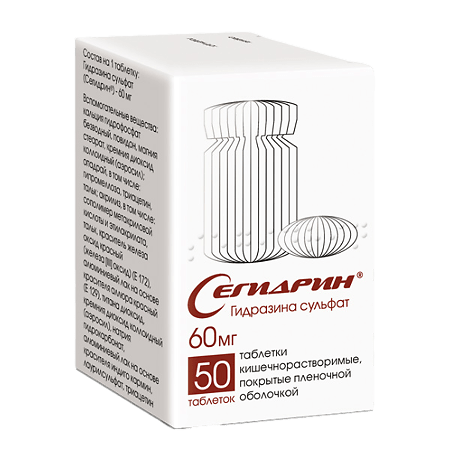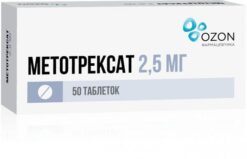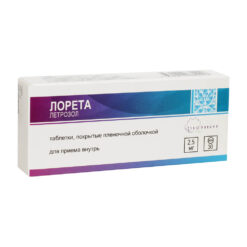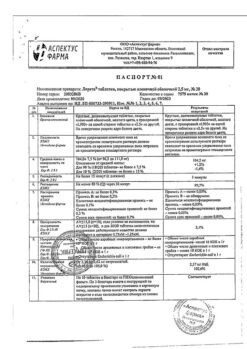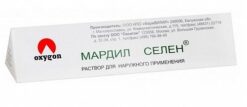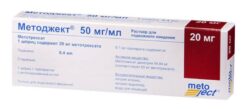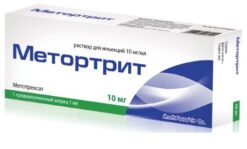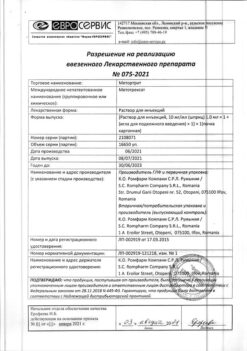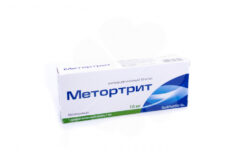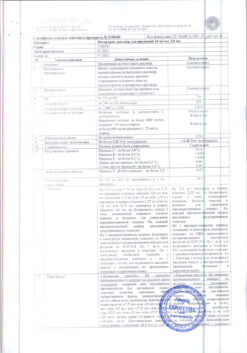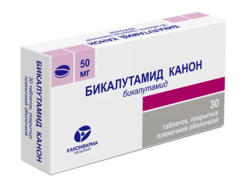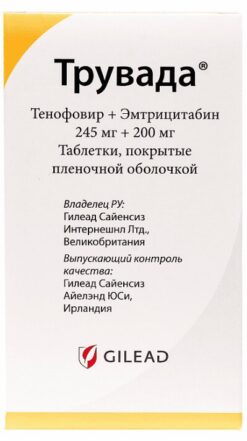No products in the cart.
Description
Pharmacodynamics
The drug inhibits tumor growth, affects a number of biochemical parameters: inhibits monoamine oxidase activity, reduces cell membrane permeability and biomembranes of subcellular structures, is an inhibitor of xenobiotic metabolism. It has symptomatic therapeutic effect in malignant neoplasms in advanced stages. It does not have myelodepressive and other side effects which are typical for many other antitumor drugs.
Pharmacokinetics
The drug content in the blood of patients reaches a maximum 2 hours after taking 60 mg (1 tablet); 24 hours later small amounts are still detected in the serum. Blood sampling 9 hours after the end of the 30-day treatment course detects 0 to 89 ng/ml of Sehydrin® in different patients.
The pharmacokinetics of Sehydrin® has also been studied in unbred intact rats and animals with sarcoma 45. The drug is rapidly absorbed from the gastrointestinal tract; blood clearance is complete by 25-28 hours after intragastric administration at a dose of 100 mg/kg.
The maximum concentration in the blood of intact animals occurs approximately 50 minutes after administration; in tumor-bearing animals (sarcoma 45), 3 hours later.
A 3-5 times higher accumulation of the substance in the liver, kidneys and lungs compared to the blood, but not in the tumor; clearance of intact organs of healthy animals and tumor carriers ends by the end of 4 days. Urinary excretion in healthy animals lasts up to 3 days and is approximately 50% of the administered amount; in tumor carriers excretion ends between the first and second day, with only 25% of the drug excreted. The volume of distribution, in intact rats, is 14 ml, in the presence of a tumor it is 29.4 ml. Tumor carriers are prone to cumulation of Sehydrin. Sehydrin® is oxidized in the body and its undegraded part is excreted with urine, partially in acetylated form (in rats and rabbits).
Indications
Indications
Symptomatic treatment of locally advanced and disseminated forms of malignant neoplasms.
In this case, the drug Sehydrin® has a pronounced symptomatic effect: reduction or elimination of pain (up to the point of drug withdrawal), feelings of weakness, symptoms of respiratory failure (shortness of breath), cough, fever, improved appetite, increased physical activity. The drug is prescribed to patients with malignant neoplasms in advanced stages (including in the preterminal phase of the process).
Pharmacological effect
Pharmacological effect
Pharmacodynamics
The drug suppresses the growth of tumors, affects a number of biochemical parameters: inhibits monoamine oxidase activity, reduces the permeability of cell membranes and biomembranes of subcellular structures, and is an inhibitor of xenobiotic metabolism. It has a symptomatic therapeutic effect for malignant neoplasms in advanced stages. It does not have myelosuppressive and other side effects characteristic of many other anticancer drugs.
Pharmacokinetics
The content of the drug in the blood of sick people reaches a maximum 2 hours after taking 60 mg (1 tablet); a day later, small amounts of it are still detectable in the serum. When blood is collected 9 hours after the end of a 30-day course of treatment, from 0 to 89 ng/ml Sehydrin® is detected in different patients.
A study of the pharmacokinetics of Sehydrin® was also performed on outbred intact rats and animals with sarcoma 45. The drug is rapidly absorbed from the gastrointestinal tract; cleansing the blood from it ends by 25-28 hours after intragastric administration at a dose of 100 mg/kg.
The maximum concentration in the blood of intact animals occurs approximately 50 minutes after administration, in tumor carriers (sarcoma 45) – after 3 hours.
An increased accumulation of the substance by 3-5 times in the liver, kidneys and lungs compared to the blood, but not in the tumor, was registered; cleansing of intact organs of healthy animals and tumor carriers ends by the end of 4 days. Excretion in urine in healthy animals lasts up to 3 days and is approximately 50% of the administered amount; in tumor carriers, elimination ends between the first and second days, and only 25% of the drug is eliminated. The volume of distribution in intact rats is 14 ml, in the presence of a tumor – 29.4 ml. Tumor carriers are prone to accumulation of Sehydrin. Sehydrin® is oxidized in the body, and its undegraded part is excreted in the urine, partly in acetylated form (in rats and rabbits).
Special instructions
Special instructions
Treatment with Sehydrin should be carried out under the supervision of a physician experienced in the use of anticancer drugs.
The drug is prescribed with caution to patients with severe impairment of liver and kidney function. The use of the drug for jaundice caused by liver metastases (especially obstructive) is not contraindicated.
It is necessary to avoid the consumption of ethanol-containing drinks, as well as foods rich in tyramine: cheese, raisins, canned foods, sausages, yoghurts.
Due to the lack of myelotoxicity, Sehydrin® is used in patients with cytopenia resulting from radiation therapy and chemotherapy.
Active ingredient
Active ingredient
Hydrazine sulfate
Composition
Composition
1 tablet contains:
Active ingredients:
hydrazine sulfate 60 mg.
Excipients:
calcium phosphate disubstituted,
polyvinylpyrrolidone,
magnesium stearate,
highly dispersed silicon dioxide,
dimethicone,
talc,
polymethacrylate,
polyethylene glycol 600,
iron oxide red (E172),
titanium dioxide
There are 10 tablets in a blister. The package contains 5 blisters.
Pregnancy
Pregnancy
Contraindicated during pregnancy and lactation.
Contraindications
Contraindications
Hypersensitivity to hydrazine sulfate and other components of the drug;
simultaneous use with all types of alcohol and barbiturates;
pregnancy and lactation;
children’s age (due to lack of experience in use).
With caution: with severe impairment of liver and kidney function.
Side Effects
Side Effects
Dyspeptic symptoms are possible (nausea, vomiting, belching), which quickly disappear with a dose reduction or a short-term (two- or three-day) break in treatment. Rare complications – insomnia, general agitation, not pronounced and transient phenomena of polyneuritis.
For dyspeptic symptoms, astringents and anti-inflammatory drugs (chamomile infusion, romazulan, vikalin), antispasmodics and antiemetics are prescribed internally. For neurotoxic effects, it is advisable to use pyridoxine hydrochloride (5% solution of vitamin B6, 1 ml intramuscularly 1-2 times a day), thiamine chloride (vitamin B1), oral multivitamin preparations and intravenous administration of a 20-40% solution of dextrose (glucose).
Interaction
Interaction
Simultaneous use of Sehydrin with barbiturates, ethanol, tranquilizers, antipsychotic drugs (neuroleptics) can lead to a sharp increase in the toxicity of Sehydrin.
In experiments on laboratory animals, in the case of preliminary administration of Sehydrin, the effectiveness of treatment with many antitumor drugs increases (with the exception of cyclophosphamide).
Storage conditions
Storage conditions
In a dry place, protected from light, at a temperature not exceeding 25 °C
Shelf life
Shelf life
3 years
Manufacturer
Manufacturer
Pharmsintez PJSC, Russia
Additional information
| Shelf life | 3 years |
|---|---|
| Conditions of storage | In a dry, light-protected place at a temperature not exceeding 25 °C |
| Manufacturer | Pharmsintez PJSC, Russia |
| Medication form | enteric soluble tablets |
| Brand | Pharmsintez PJSC |
Related products
Buy Sehydrin, 60 mg 50 pcs. with delivery to USA, UK, Europe and over 120 other countries.

